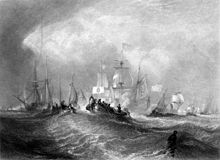User:Prinsgezinde/sandbox
| Dutch Invasion of England | |||||||
|---|---|---|---|---|---|---|---|
| Part of Nine Years' War and the Glorious Revolution | |||||||
 Prince of Orange Landing at Torbay | |||||||
| |||||||
| Belligerents | |||||||
|
|
| ||||||
| Commanders and leaders | |||||||
|
|
| ||||||
| Strength | |||||||
|
Dutch fleet of 500 ships[1][2][3] Initially 15,000[5]-20,000[1]-21,000[4][2] soldiers, later increased[2] |
Initially 40,000 soldiers (dispersed all over the country),[2][6] though many switched sides | ||||||
| Casualties and losses | |||||||
| Low on both sides | |||||||
Background[edit]
After the 1660 restoration of the English monarchy, English republican Algernon Sidney repeatedly tried to convince the Kingdom of France, the Dutch Republic and English republicans to launch a joint attack on the English crown by invading England and turning it back into a commonwealth. While Louis XIV of France invested a small sum of money, none of the parties agreed to provide troops nor were they keen on the idea of working together. Grand pensionary Johan de Witt likewise declined the offer in 1665, among other reasons being that he feared retribution against the Republic should the plan fail.[7]
However, after the Republic landed a major strategic victory in the Four Days' Battle, De Witt immediately readied plans for an invasion that would involve its ally France. The first attempt was made in 1666, but failed due to an overcalculation of English losses in and France's eventual decision not to take part in it. A second attempt, the Raid on the Medway, was much more successful, but plans of an actual invasion were discarded during the operation in favour of a hit-and-run tactic that would prevent English retaliation.[8]
A major turning point came in the form of what the Dutch called the Rampjaar of 1672. A surprise alliance and invasion by France, England, Münster and Cologne nearly destroyed the country. Although all invaders were eventually driven off or made peace with, the shock caused the end of the Stadtholderless Period and the death of
References[edit]
- ^ a b c The 1688 invasion of Britain that's been erased from history, Daily Mail
- ^ a b c d History in the making: The Glorious Revolution of 1688-91 was really a Dutch invasion; this distortion of the facts reflects our narrow view of Britain's past, argues Jonathan Israel, The Independent
- ^ a b c (Dutch) Hoe Willem III Engeland 'bevrijdde', Historisch Nieuwsblad
- ^ a b c d e The Glorious Revolution, BBC History
- ^ (pdf) The Glorious Revolution Factsheet G4, House of Commons Information Office
- ^ Padfield, Peter (2000). Maritime supremacy & the opening of the western mind : naval campaigns that shaped the modern world. Woodstock, N.Y: Overlook Press. p. 121. ISBN 1585670022.
- ^ Sidney, Algernon (1996). Court maxims. New York: Cambridge University Press. p. 14-15. ISBN 0521467365.
- ^ Coox, Alvin D. (Winter 1949). "The Dutch Invasion of England: 1667". The Journal of Military History. 13 (4). Society for Military History: 223‑233. Retrieved 10 July 2016.

